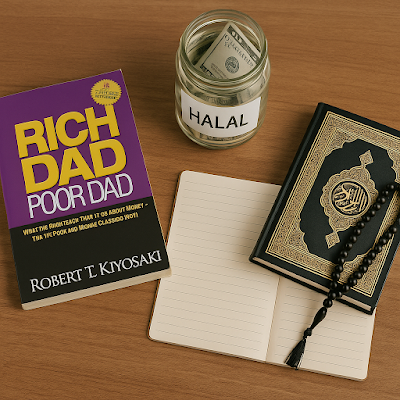“The poor work for money. The rich make money work for them.”
— Robert Kiyosaki
As a Muslim student, I found the book Rich Dad Poor Dad powerful — but I also believe we must view it through the lens of Islam. This blog post will share 5 key lessons from the book and how they apply to us as Muslim youth.
🧠 Lesson 1: Financial Education Is More Important Than Grades
In the book, the “rich dad” teaches that understanding money — not just earning it — is the real skill.
As Muslim students, we should learn halal ways of investing, budgeting, and saving, because we are accountable for every dirham we spend.
“The feet of the son of Adam will not move on the Day of Judgment until he is asked… about his wealth — how he earned it and how he spent it.”
— Prophet Muhammad ﷺ (Tirmidhi)
🏢 Lesson 2: Don’t Work Just for a Paycheck
Kiyosaki says poor people stay stuck in the cycle of working for money. Rich people build assets — like businesses or investments — that earn for them.
As Muslims, we can build halal income streams through:
-
Online businesses (e.g., blogs, YouTube)
-
Investing ethically (no riba, no gambling)
-
Selling knowledge (teaching, freelancing)
🏗️ Lesson 3: Build Assets, Not Liabilities
An asset puts money in your pocket. A liability takes money out.
Instead of spending money on unnecessary things, we should:
-
Invest in books 📚
-
Learn digital skills 💻
-
Save for charity & future goals 💸
Even writing this blog is a kind of asset, inshaAllah — you’re learning and helping others too.
🌱 Lesson 4: Take Risks, but with Wisdom
The rich dad encourages smart risks. Islam also supports this — as long as it’s not based on greed or haram means.
We can:
-
Try freelancing platforms
-
Start a small halal side hustle
-
Create content that helps others
But always make dua for barakah, and never risk anything that puts your deen or family in danger.
🤲 Lesson 5: Money Is a Tool, Not a God
The “poor dad” was always worried about money. The “rich dad” saw money as a tool.
Islam teaches balance:
-
Don’t worship money.
-
Use it for good.
-
Don’t fear poverty — fear losing taqwa.
📌 Final Thoughts:
Rich Dad Poor Dad is a powerful book, but we must add Islamic values to the lessons. True success is not just financial — it’s also spiritual.
“Whoever fears Allah, He will make a way out for him and provide for him from where he does not expect.”
— Qur'an 65:2-3

Comments
Post a Comment